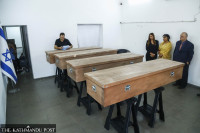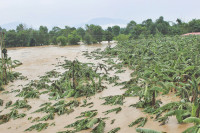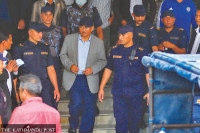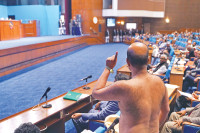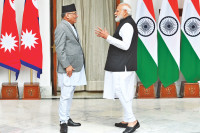Special Supplement
Yearender 2023: The year of crises
2023 was unforgettable for the Nepali people. A terrible, devastating year that has scarred many, in multiple ways.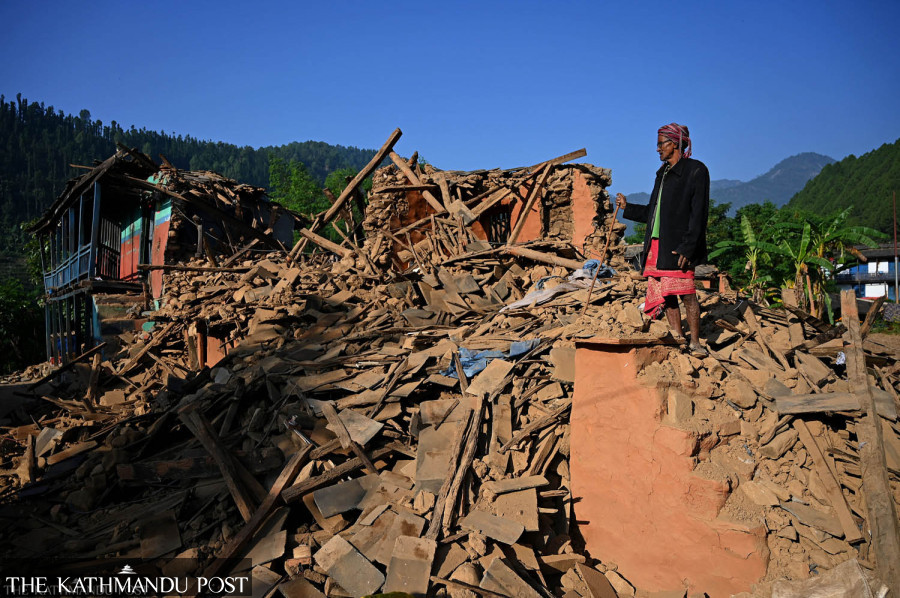
Sangam Prasain
Nepal continued to grab headlines of economic crisis, geopolitical debacle, plane crashes, earthquakes, mass protests, political corruption and arrests and also a renewed debate over Hinduism—throughout the year 2023.
2023 was an unforgettable year for the Nepali populace. A terrible, devastating year that has scarred many, in several ways.
The year had an ominous start. It started with the worst air disaster.
An ATR 72 aircraft of Yeti Airlines that flew to Pokhara from Kathmandu crashed in Pokhara on January 15, drawing attention to the country’s air safety record.
The crash that killed all 72 people on board has shed light on Nepal’s deeper regulatory failure.
In July, a helicopter carrying foreign tourists crashed near Mt Everest, killing all six people, including five Mexican tourists on board.
Industry insiders say that the frequent air disasters have put off high-end travellers who spend heavily from visiting Nepal and kept Nepal on the air safety list of the European Union for the last 10 years. Nepal has shown no political will to address the grave air safety issues which has sent out a negative message to the international community including luxury travellers.
Another worrying issue Nepal had to come to terms with in 2023 has been a mass exodus of Nepali youth.
Nearly a million Nepalis left the country, including students, in a year in search of a better future abroad.
“The striking surge in young people emigrating from the country is because the country has been marred by crippling economic crises. There are no job opportunities and corruption is thriving,” said Chandramani Adhikari, a senior economist.
“What remains most worrisome is that youngsters have lost hope in the country.”
Many believe that the drain is irreversible.
Economists say this is a recipe for disaster because Nepal is losing a vibrant workforce.
“Roads have reached almost every village, a sign of prosperity. But the irony is that those villages are empty,” said Adhikari.
However, on the upside, the increased number of labour migrants has led to an increase in remittance inflow.
“But this growing remittance trend should no longer be considered a blessing. It reflects not only the failure of the country to provide for its people but also the waning hopes of the progressive youth,” said Adhikari.
The repercussions of mass exodus have now become real and visible.
Economists say that as over a million young people leave the country each year for foreign jobs, consumption—the principal driver of economic growth—has been curtailed.
“Youngsters were the customers of the restaurants, bars and coffee shops. And these eateries were also primarily driven by them,” said Pramod Jaiswal, former President of the Restaurant and Bar Association, who owns Mela Restaurant.
Every market from that of luxury mobile sets to internet service providers to motorbikes to alcoholic beverages has seen a lull in demand.
“The demand in the market or consumption has remained stagnant, leading to the closure of shops in commercial centres,” Adhikari told the Post.
Due to low production and demand, unemployment numbers have increased, as the government data proves.
Inadvertently, the economic crisis dominated the headlines this year.
Nepal plunged into its first recession in six decades as economic output continued to be weighed down by inflation and political instability.
Insiders say that even entrepreneurs have shuttered their shops and are seeking overseas jobs.
The country’s financial troubles have been exacerbated by the pandemic. Then the war in Ukraine caused an inflationary impact on commodities and food prices for the import-driven country like Nepal.
Following pressure to generate revenue, everything has been taxed now—from potatoes to onions. Even Nepalis planning to visit abroad as tourists have to pay taxes at home.
Experts say this is a mockery of socialism.
The country has, on the one hand, a budgetary deficit—that is, it spends beyond its revenues and is carrying very high levels of foreign debt.
Anger against the government's handling of the economy has spilt over into the public sphere.
In January, an entrepreneur Prem Acharya set himself on fire in front of Parliament building. He later died of his injuries.
It manifested the despair and woes of the people resulting in anarchy and highlighted the irregularities subsisting in the country.
2023 was rocked by two big corruption scandals involving major political parties. In the fake refugee scandal and the Lalita Niwas land grab, top politicians and scores of high-level government officials were arrested despite parties attempting to protect their officials.
“If the political system is dishonest, it sends a wide shock across the society. By many measures, people are unhappier than they have been in years,” said Chaitanya Mishra, Professor of Sociology at Tribhuvan University.
“If the political leaders you elect and send to rule the country start to loot, it causes economic, social, and other problems. No one is happy in the country.”
Corruption has a devastating impact on countries’ economies, employment, income, education, health and food supply for tens of thousands of people.
“Everything is expensive here. People don’t have money to send their children to a private school. People are struggling to pay for healthcare,” said Mishra.
“On the other hand, politicians are becoming richer.”
The poor, the disadvantaged and the most vulnerable—those the political class purports to help—are the people hurt most by the political class, says Mishra.
2023 was the year of mismanagement and geopolitics abound.
On November 3, at 11:47 pm, a 6.4 magnitude earthquake occurred in Jajarkot in western Nepal. A total of 153 casualties have been confirmed, with 17,824 households in the two districts fully destroyed.
At least 38 people who survived an earthquake in Nepal have died after spending more than a month living in tents in freezing temperatures.
Rights activists say that the government’s mismanagement is killing people, particularly the children and pregnant women, who braved the earthquake.
Pokhara rang in the new year to the whine of turboprop engines as Nepal opened another international airport in under a year, highlighting its airport-building spree.
Prime Minister Pushpa Kamal Dahal declared the airport open on January 1 while the city of Pokhara gave its citizens the day off to allow them to celebrate the fulfilment of a five-decade-old dream.
The airport in the scenic Himalayan valley is the gateway to the world-famous Annapurna Circuit trekking route. But after a year, except for a few chartered flights, there are no international flights.
The opening of the Pokhara airport in January 2023 was marred by geopolitical tensions.
The Chinese Embassy in Nepal declared the airport "the flagship project" of China and built under its Belt and Road Initiative cooperation.
Nepal, though, has been denying it.
However, some positive headlines were coming from the northern neighbour.
In March, Beijing allowed its citizens to travel to Nepal as tourists after more than three years. Beijing re-opened the Tatopani border point for people’s movement in September after reopening two-way cargo movements on May 1.
In November, China reopened the Korala border point for both trade and travel movements after a hiatus of four years since it was closed.
This year bans on food commodities by India also made frequent headlines. After wheat, rice and sugar, India added dry onions to its list of food staples slapped with sweeping export restrictions.
India is keeping domestic food prices in check with export bans—but it has been impacting Nepal—triggering shortages and fueling inflation.
In a bid to mend the souring relationship with New Delhi, Prime Minister Dahal visited India in May, leading a delegation of four dozen ministers and government officials. The high expectations soon turned low.
As Nepal sought India’s help to ensure the economic viability of its two new airports built by China, Prime Minister Narendra Modi assured his counterpart that New Delhi would positively consider approving more air routes for the entry and exit of aircraft to and from the neighbouring country.
New Delhi, however, has tread the issue cautiously.
Critics have accused Dahal of handing over the multi-billion-dollar hydropower projects to India through government-to-government deals.
In exchange, Prime Minister Dahal returned from India with a gift of 15 Murrah buffalos.




 17.12°C Kathmandu
17.12°C Kathmandu
